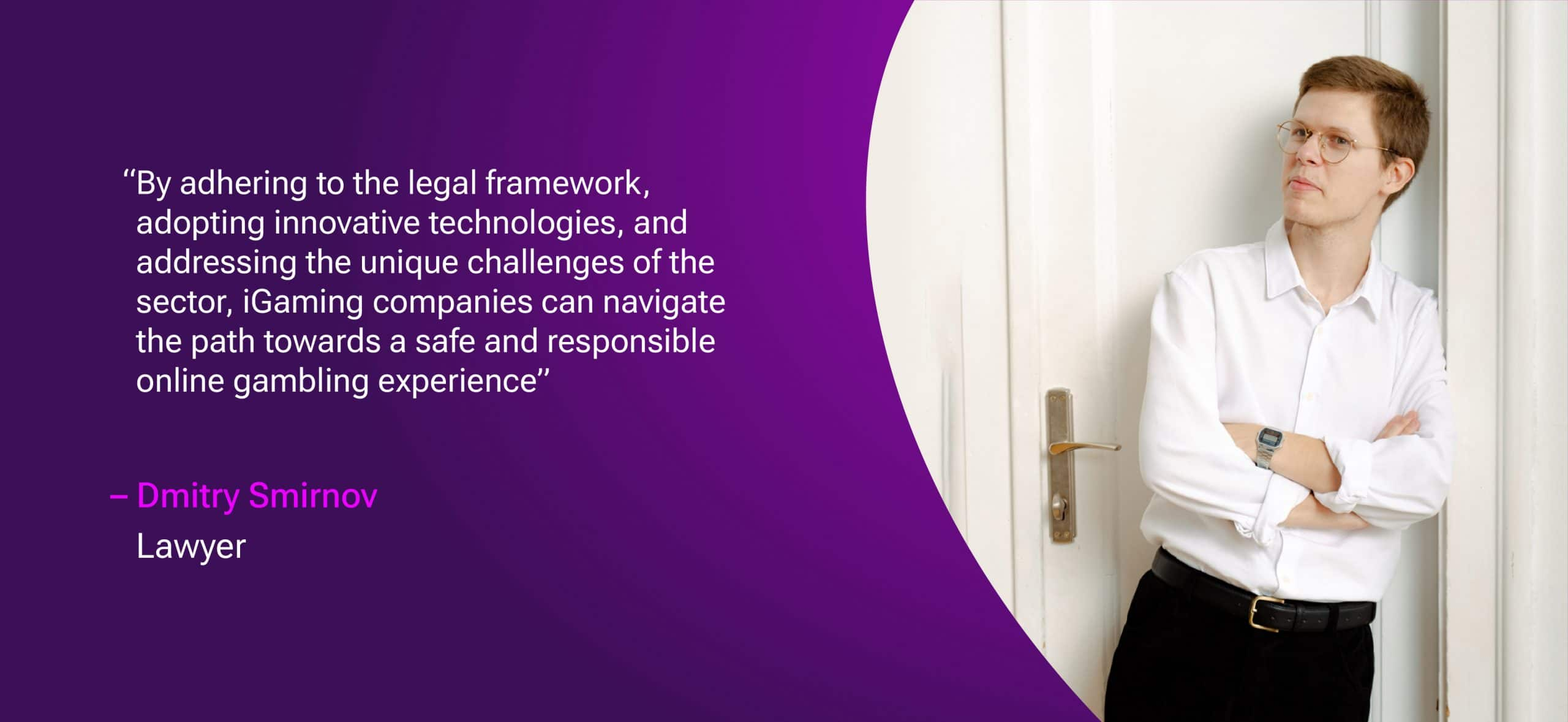The world of iGaming has witnessed remarkable growth in recent years. However, with this surge in popularity comes an ever-increasing concern over potential financial crimes, including money laundering, as well as exploitative techniques, such as arbitrage betting, bonus abuse, and others.
To tackle these issues, the iGaming industry relies on two pillars: Anti-Money Laundering (AML) and Know Your Customer or Know Your Client (KYC) mechanisms.
In this article, Dmitry Smirnov, EvenBet Gaming Lawyer, explores the significance of AML, KYC verification, and KYC process in iGaming, their legal framework, their importance, and the current solutions and challenges they entail.
The Importance of AML and KYC in iGaming
The iGaming sector is no stranger to facing many risks, including operational risk, IT and cyber risks, regulatory compliance, money laundering, liquidity, solvency risk, and reputational risk.
Criminals might exploit online gambling platforms as a means to legitimise their illicit funds, making the industry vulnerable to financial crimes. Therefore, it is crucial for iGaming companies to implement a dedicated KYC program to comply with Anti-Money Laundering, Terrorist Financing, and GDPR regulations. Failing to implement effective AML and KYC measures can have severe consequences for such companies that include regulatory penalties, financial losses, damage to reputation, and even legal action.
While AML and KYC mechanisms are vital for combating financial crimes, they offer a range of benefits to the iGaming sector. By ensuring a secure and compliant environment, they build consumer trust and enhance the industry’s credibility. Players are more likely to engage with platforms that prioritise their safety.

Legal Mechanisms AML and KYC
AML and KYC mechanisms play a critical role in safeguarding the industry against financial crimes, fostering trust, and ensuring a secure environment for players.
Specific Legal Requirements for AML in iGaming
- Reporting Obligations: iGaming companies are mandated to report any suspicious transactions to relevant authorities. These reports serve as triggers for investigations into potential money laundering activities.
- Due Diligence: A fundamental aspect of AML involves conducting comprehensive due diligence on customers. This process includes verifying their identities and assessing their risk profiles.
- Monitoring Suspicious Transactions: Ongoing monitoring of transactions is indispensable for detecting patterns that may indicate money laundering activities.
Know Your Client Process in Online Gambling
The KYC process in iGaming includes several key components:
- Client Identity Verification: Establishing the identity of customers is the initial step in KYC process. This encompasses collecting and verifying identity documents, such as government-issued IDs and utility bills that serve as proof of address.
- Constant Customer Behavior Monitoring: KYC entails regular monitoring of customer behaviour to ensure alignment with established patterns and to detect any suspicious activities.
The Role of Regulatory Authorities
Regulatory authorities play a pivotal role in ensuring AML and KYC compliance within the iGaming industry. They establish guidelines and enforce regulations, and non-compliance can lead to severe penalties.
Current Solutions and Practices
In order to meet AML and KYC requirements effectively iGaming companies may employ the following tools and approaches:
- Technologies and Tools
Identity Verification Software: Such software simplifies the process of confirming the identity of customers, streamlining onboarding, and ensuring regulatory compliance.
Transaction Monitoring Systems: These systems help iGaming companies track and analyse customer transactions in real-life, flagging potentially suspicious activities.
- Case studies
By examining practical examples of iGaming companies successfully implementing AML and KYC measures, we can gain insights into best practices and witness the effectiveness of these measures.
- New Trends and Innovations
The iGaming industry explores innovative solutions like blockchain technology to guarantee transparency and security in financial transactions. Blockchain enhances data security by providing a decentralized and tamper-proof ledger system, reducing the risk of data breaches. This transparency ensures publicly verifiable records of transactions and gameplay, promoting fair gaming.
On the other hand, blockchain’s smart contracts play an important role in guaranteeing fair gameplay by eliminating the need for intermediaries, while cryptocurrencies enable efficient and secure financial transactions, ensuring quick access to funds and reducing the risk of fraud.

For example, the implementation of KYC processes is crucial for identifying individuals or groups involved in arbitrage betting. To improve effectiveness tools like biometric verification, artificial intelligence (AI) and machine learning (ML) are utilised. Biometric Verification helps prevent tactics such as creating accounts while AI and ML swiftly detect any unusual betting patterns.
Real-life examples demonstrate how KYC is effectively used to combat arbitrage betting and offer insights into the challenges faced during implementation. Despite obstacles related to data privacy and costs, continuous technological advancements promise sophisticated KYC solutions that ensure a secure betting environment.
Incorporating verification and behavioural analytics into enhanced KYC solutions plays a vital role in identifying and tracking individuals engaged in arbitrage betting. Regulatory frameworks adapt to acknowledge the impact of arbitrage betting while maintaining a balance between legality and operator interests. Although challenges persist ongoing technological innovations, robust KYC/AML procedures, collaborative efforts, and supportive regulatory frameworks pave the way for a fair betting ecosystem. These efforts ensure growth and transparency within the industry.
To illustrate this point further let’s consider a case from April 2023 at Basildon Crown Court in the UK where Jon Howard was found guilty of defrauding Bet365. The Essex Serious Crime Directorate confirmed his attempt to net £236,000 by exploiting over 1,000 identities through bonus abuse. Howard received a five-year jail sentence because he tried to make these funds appear legitimate by fabricating a job on a mortgage application.
Issues and Considerations
- Challenges in Implementation
iGaming companies often face challenges related to the complexity of regulations, the need for advanced technology, and the ever-evolving nature of money laundering tactics. Addressing these issues is crucial for successful AML and KYC implementation.
- Balancing Customer Privacy and AML/KYC
Finding the delicate balance between preserving customer privacy and fulfilling AML and KYC requirements is essential to ensure customer trust.
- Global and Regional Differences
iGaming companies operating on a global scale must navigate varying AML and KYC rules and regulations in different regions. Understanding and adapting to these differences is key.
Future Trends and Regulatory Developments
- Potential Future Changes
Expectations for future changes in AML and KYC rules are influenced by emerging technologies and global financial trends.
- Impact of Evolving Technologies
As technology continues to advance, it will both enhance the capabilities of AML and KYC mechanisms and present new challenges. Companies must stay ahead of the curve to remain compliant.
- Recommendations for Compliance and Adaptation
Staying compliant with evolving AML and KYC regulations requires a proactive approach. Companies should invest in robust AML and KYC solutions, stay informed about regulatory changes, and remain flexible to adapt to new requirements.

Conclusion
In the dynamic and ever-expanding world of iGaming, AML and KYC mechanisms are indispensable for maintaining integrity, trust, and compliance. Effective implementation safeguards the industry against financial crimes fosters a secure and welcoming environment for players and sets the stage for long-term success and sustainability. At EvenBet Gaming we believe that by adhering to the legal framework, adopting innovative technologies, and addressing the unique challenges of the sector, iGaming companies can navigate the path towards a safe and responsible online gambling experience.



 Upd: 27 August 2024
Upd: 27 August 2024 





















